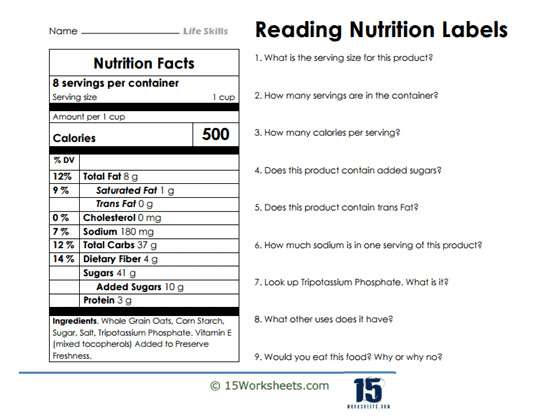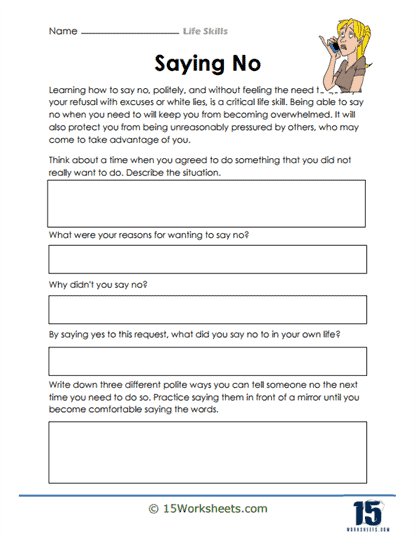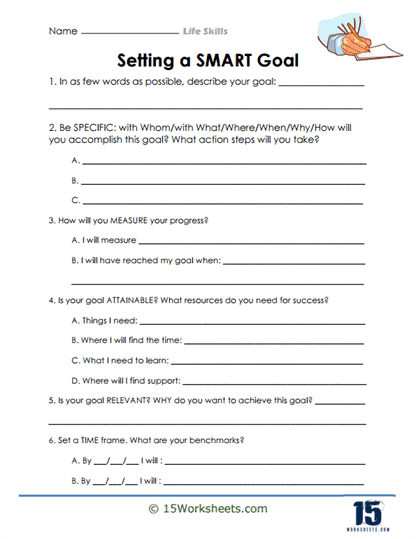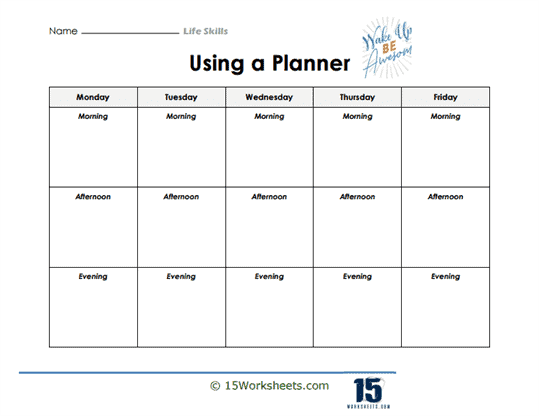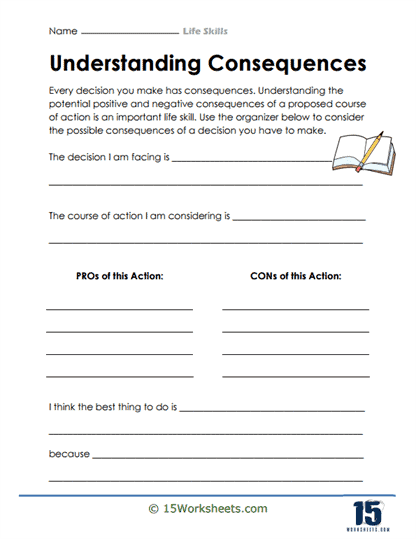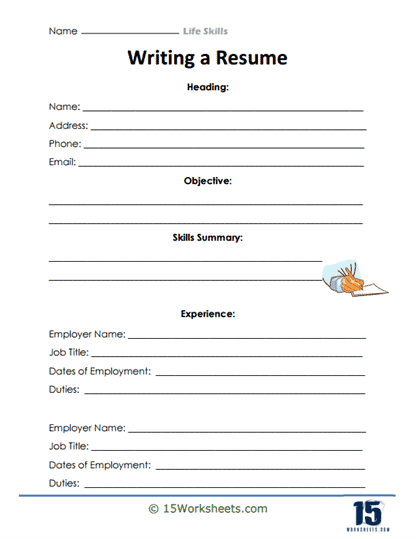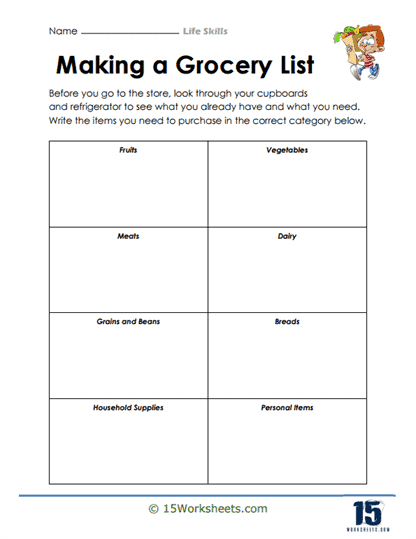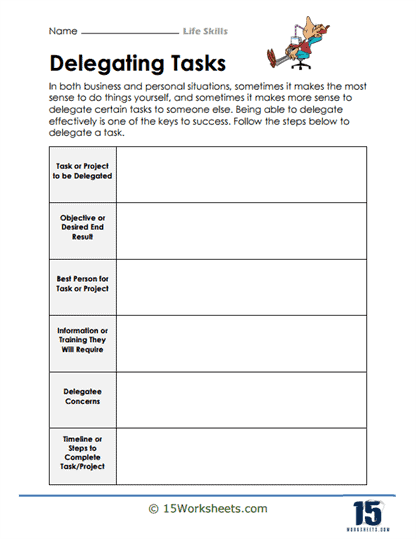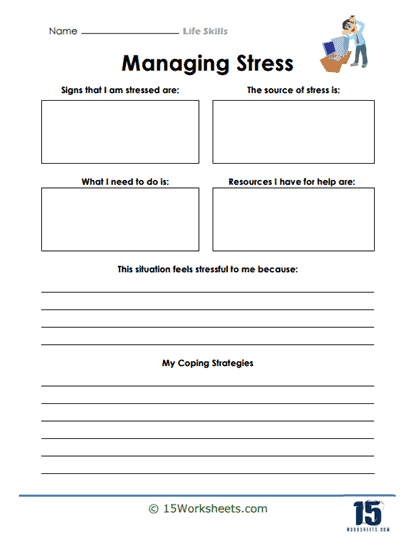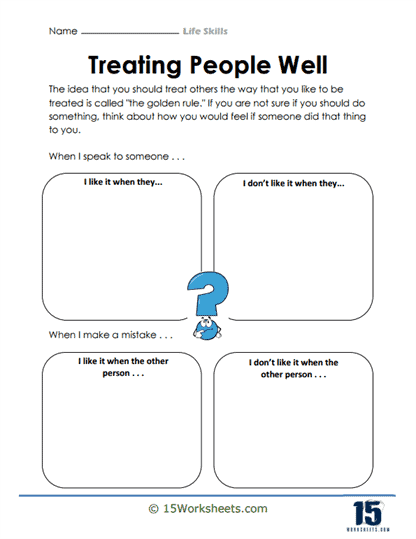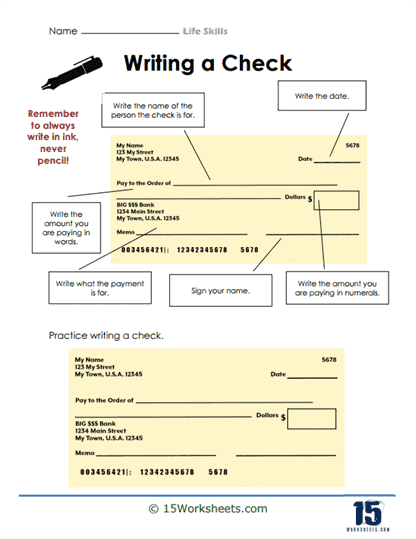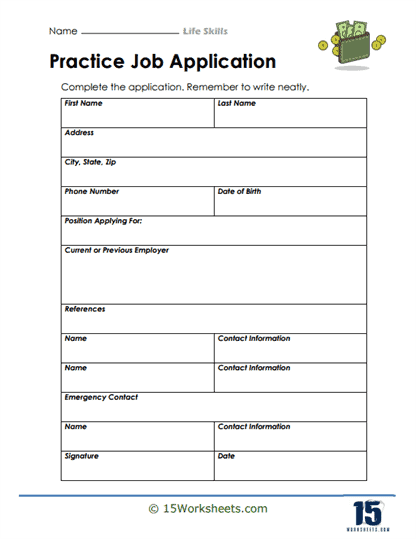Life Skills Worksheets
All About These 15 Worksheets
These worksheets will help students develop essential skills for managing daily life, both inside and outside the classroom. These worksheets cover a wide range of topics, from basic household tasks like cooking and cleaning to more complex skills like financial literacy, time management, and communication. The goal of life skills worksheets is to equip students with practical knowledge and habits that they can apply in real-world situations, ultimately preparing them for independence and success in adulthood.
The importance of life skills education cannot be overstated. While academic subjects such as math, science, and literature are critical, life skills complement this learning by teaching students how to navigate the challenges of everyday living. Whether it’s learning how to budget, solve problems, manage emotions, or make responsible decisions, life skills give students the tools they need to thrive in a rapidly changing world. Life skills worksheets break down these skills into manageable activities and lessons, making it easier for students to grasp and apply the concepts.
Life skills worksheets are particularly helpful because they focus on practical applications that students can immediately use in their day-to-day lives. For example, worksheets on budgeting teach students how to manage their money responsibly, helping them understand the value of saving, planning for expenses, and making informed financial decisions. These worksheets often present real-life scenarios, such as planning a grocery shopping trip or managing an allowance, so that students can see how budgeting applies to their current and future lives.
In addition to financial literacy, they often address time management and organization-skills that are essential for academic success and personal well-being. Students learn how to prioritize tasks, set realistic goals, and plan their time effectively. For instance, a worksheet might help students create a weekly schedule, breaking down schoolwork, extracurricular activities, and personal time. These exercises help students develop discipline and focus, which are critical for handling increasing responsibilities as they grow older.
Another key benefit of the worksheets is their focus on problem-solving and decision-making. Through these activities, students practice evaluating situations, considering different solutions, and making choices that align with their values and goals. For example, a worksheet may present a scenario in which students have to resolve a conflict with a friend or decide how to spend their time between studying and relaxing. These exercises help students build critical thinking skills and emotional intelligence, enabling them to approach challenges with confidence.
They also cover topics like communication and interpersonal relationships. These worksheets teach students how to express their thoughts and feelings clearly, listen to others, and manage disagreements constructively. For example, an exercise might involve role-playing a difficult conversation or practicing how to give and receive feedback. Developing these communication skills is crucial not only for personal relationships but also for future success in the workplace, where teamwork and clear communication are often key to achieving goals.
Types of Exercises
This collection of worksheets features a wide range of exercises designed to target specific skill areas. One common type of exercise is scenario-based problem-solving. In these activities, students are presented with a real-life problem and must choose how they would handle it. For example, a worksheet might describe a situation in which a student has to decide between spending money on a new video game or saving that money for a larger purchase in the future. Students are asked to evaluate the pros and cons of each option, make a decision, and explain their reasoning. This exercise encourages thoughtful decision-making and teaches students how to weigh short-term desires against long-term goals.
Budgeting exercises are another essential component of the set. These activities often involve creating a budget based on a fixed income or allowance. Students are tasked with allocating money to different categories, such as savings, groceries, entertainment, and bills. Some worksheets may include unexpected expenses or changes in income, forcing students to adjust their budget accordingly. This type of exercise helps students understand the importance of financial planning and the impact of their spending decisions.
Time management worksheets include exercises that help students plan and organize their days or weeks. One common activity involves creating a schedule based on a list of tasks or priorities. For instance, students might be given a set of assignments, extracurricular activities, and personal responsibilities and asked to create a balanced schedule that ensures everything gets done on time. These exercises teach students how to prioritize tasks, avoid procrastination, and manage their workload effectively.
Interpersonal and communication skills are another focus. These worksheets may include role-playing scenarios where students practice handling various social situations, such as resolving a conflict with a classmate, asking for help, or delivering constructive criticism. For example, a worksheet might present a situation in which a friend is upset, and the student has to figure out how to communicate with empathy and resolve the issue. These exercises encourage students to think about how their words and actions affect others and to practice clear and compassionate communication.
You will also find self-care and wellness activities as well. These worksheets may cover topics like mental health, emotional regulation, and physical health, teaching students how to take care of themselves in a holistic way. For instance, a worksheet might involve creating a balanced meal plan or a personal wellness routine that includes exercise, rest, and relaxation. These activities help students develop healthy habits that contribute to their overall well-being.
Cooking and household management are other areas often explored in this awesome collection. These worksheets might involve simple cooking instructions or meal-planning activities where students are asked to choose nutritious meals while staying within a budget. For example, a worksheet could guide students through preparing a basic recipe or making a grocery list for the week. This helps students become more independent and capable of managing their own household responsibilities.
What Skills Do Adults Need for Daily Life?
Navigating daily life as an adult requires a diverse set of skills, ranging from personal management to interpersonal communication and practical, everyday tasks. These skills are essential for maintaining a balanced, fulfilling lifestyle and for managing the various challenges that come with both personal and professional responsibilities. To live effectively and harmoniously, adults must continuously develop and refine a broad spectrum of abilities. Life doesn’t come with a manual, but learning these skills through practice and targeted exercises can make a world of difference in how adults manage their time, relationships, and responsibilities.
One of the key areas of focus for adults is personal skills, which involve managing oneself in various aspects of life. Time management, for example, is a crucial skill that allows individuals to prioritize tasks, meet deadlines, and avoid feeling overwhelmed by competing demands. Adults who can effectively manage their time often find themselves more productive and less stressed. For instance, life skills worksheets on time management might include activities that help adults break down their daily or weekly tasks into manageable chunks. They could practice creating schedules or prioritizing tasks based on importance and urgency, a skill that translates directly into improved efficiency both at home and work.
Self-discipline and decision-making are also essential components of personal skill development. These are the skills that guide adults in making choices that align with their long-term goals and values, whether it’s sticking to a fitness routine or making smart financial decisions. Decision-making exercises often involve scenario-based activities where adults must weigh the pros and cons of different choices, helping them practice thinking critically before acting. For example, a worksheet might present a scenario in which an adult must choose between spending money on an impulse purchase or saving for a future goal, allowing them to reflect on the long-term impacts of their decisions.
In addition to managing one’s time and decisions, problem-solving and critical thinking are invaluable skills for navigating the challenges of daily life. These skills enable adults to analyze complex situations, consider various solutions, and choose the most effective path forward. Whether it’s resolving an issue at work or finding the best way to handle a personal problem, these skills can be strengthened through targeted exercises. Problem-solving worksheets might present hypothetical challenges that adults are likely to face, such as managing a family budget or dealing with a household emergency. By practicing these skills in a controlled environment, adults can better prepare for real-life situations, enhancing their ability to adapt and make informed choices.
Interpersonal Skills: Communication and Conflict Resolution
In addition to personal management skills, interpersonal skills are crucial for maintaining positive relationships and navigating social situations effectively. Among these, communication and conflict resolution stand out as fundamental skills for personal and professional success. Good communication involves not only speaking clearly but also practicing active listening and showing empathy toward others. Communication worksheets might include role-playing exercises that encourage adults to practice both expressing their own thoughts and understanding the perspectives of others. This practice helps adults improve their ability to engage in meaningful conversations, ask questions, and navigate discussions in a way that fosters connection and understanding.
When it comes to interpersonal challenges, few skills are more important than conflict resolution. Whether in the workplace, at home, or in social settings, disagreements are inevitable. However, the way adults handle these conflicts can significantly impact the quality of their relationships. Conflict resolution worksheets provide adults with strategies for managing disagreements in a constructive and peaceful manner. For example, a worksheet might guide participants through a conflict scenario where two colleagues disagree on how to complete a project. The exercises could involve practicing how to listen actively, negotiate solutions, and express one’s needs without escalating the conflict.
A key element of conflict resolution is understanding the emotions and motivations of others. Worksheets designed to improve conflict resolution skills often focus on helping adults develop empathy and emotional intelligence. These worksheets might include activities that prompt adults to reflect on how they feel during a conflict and how their emotions influence their behavior. By understanding their own emotional triggers and recognizing the emotions of others, adults can approach conflicts with greater patience and understanding, leading to more successful and harmonious outcomes.
Negotiation and teamwork are other essential interpersonal skills that go hand in hand with conflict resolution. Many conflicts arise from competing interests or perspectives, and negotiation is the process of finding a middle ground that satisfies all parties. Teamwork exercises, such as group problem-solving tasks, encourage adults to work collaboratively and develop a sense of shared responsibility. These worksheets might include scenarios that require compromise and cooperation, teaching adults how to navigate group dynamics in a way that strengthens relationships and leads to effective solutions.
Practical Skills: Financial Literacy, Household Management, and Self-Care
Beyond personal and interpersonal skills, adults need a variety of practical skills to manage the demands of daily life. Financial literacy is one of the most important practical skills, as it directly impacts an adult’s ability to manage their income, savings, and expenses. Financial management worksheets might focus on helping adults create a budget, track their spending, and set financial goals. For instance, an exercise might involve giving participants a hypothetical monthly income and a list of expenses, challenging them to allocate funds while staying within their budget. These types of activities not only build financial awareness but also teach adults how to make responsible financial decisions, such as saving for emergencies or planning for retirement.
In addition to managing finances, adults must also develop skills in household management, including cooking, cleaning, and general maintenance. These are often taken for granted but are essential for maintaining a healthy and organized living environment. Life skills worksheets can provide adults with practical checklists and guides for performing household tasks efficiently. For example, a worksheet might walk adults through creating a weekly cleaning schedule, or it could provide a step-by-step guide for preparing a simple, nutritious meal. Learning these skills not only contributes to a healthier lifestyle but also fosters a sense of independence and self-sufficiency.
Self-care is another practical skill that is often overlooked but is critical to maintaining overall well-being. Self-care involves taking the time to prioritize one’s mental, emotional, and physical health. Worksheets that focus on self-care might include exercises in mindfulness, stress management, and emotional regulation. For instance, a self-care worksheet could guide adults through creating a personalized wellness plan that includes regular exercise, proper sleep, and relaxation techniques like meditation. These activities help adults understand the importance of caring for themselves in order to remain balanced and productive in their everyday lives.
Digital literacy is another modern life skill that has become increasingly important in today’s technology-driven world. Adults must be able to navigate digital tools and platforms effectively, whether for work, communication, or personal organization. Worksheets focusing on digital literacy might include tutorials on using email, managing files, or staying safe online. Learning these skills can empower adults to engage with technology confidently and efficiently, which is essential for professional success and for staying connected in a digital age.
Adapting and Evolving
The world is constantly changing, and so too are the demands of daily life. This means that adults need to continuously adapt and improve their skills to stay current and effective. Adaptability is a skill in itself, and life skills worksheets can help adults develop a mindset of flexibility and openness to change. For example, a worksheet might include activities that encourage adults to reflect on past challenges they’ve faced and how they adapted to overcome them. By practicing adaptability, adults are better equipped to handle unexpected changes, whether in their personal or professional lives.
Goal setting and self-awareness are also critical for continuous improvement. Worksheets that focus on these areas might involve activities where adults define their long-term personal or professional goals and then break them down into actionable steps. By teaching adults how to set achievable goals and reflect on their progress, these worksheets encourage a habit of lifelong learning and growth. For example, an adult looking to improve their financial literacy might set a goal to learn about investing, with steps that include reading financial books, attending a workshop, or practicing with online budgeting tools.
By breaking down personal, interpersonal, and practical skills into structured exercises, these worksheets provide adults with the tools they need to function effectively, solve problems, and maintain balanced relationships. Whether it’s learning how to manage money, resolve conflicts, or take care of one’s physical and emotional health, life skills worksheets offer practical guidance that prepares adults for the challenges and opportunities they encounter throughout their lives. Continuous development of these skills ensures that adults are not only capable but also adaptable and resilient in the face of life’s inevitable changes.

